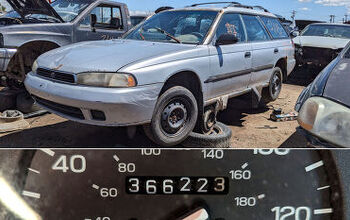Porsche Rakes in $17,250 on Every Car It Sells

While still exclusive, Porsche is gradually becoming a more populous and profitable brand. It delivered 238,000 vehicles last year and posted an operating profit of $4.1 billion — a 14-percent increase over 2015’s accounting.
A little back-of-the-envelope math places the per-car profit at roughly $17,250. As a premium automaker, you’d expect it to rake it in on every vehicle sold. However, Porsche doesn’t limit production to the same extent that Ferrari does in order to maintain artificially high prices. And it absolutely decimates other premium brands that offer exclusivity at a higher volume. BMW and Mercedes-Benz both hover at around $5,000 in profit per car.
Porsche seems to have struck an ideal balance. While its per-car profit was actually higher a few years ago — $23,000 in 2013 — it wasn’t making quite as much money overall. At the time, Bentley pulled in roughly 21 grand per unit and sold fewer vehicles overall. Since then, Porsche has shifted some of its focus downmarket, introduced the Macan, expanded its volume, increased income, and still managed to maintain a sweet profit margin on every vehicle sold.
How did it manage that? Basically, the same way Ford wrangles its F-150.
Ford typically brings in $10-14K on every truck it sells — much more than its average passenger vehicle. Like F-Series buyers, Porsche owners are extremely loyal to the brand and are more than happy to spend more to option out their chosen model. Both companies can sell at volume, keep prices up, and maintain a cult-like following because people love what they are buying. Special edition F-Series are marked up thousands of dollars for what is basically some additional badging, chrome details, and higher quality leather.
The same goes for Porsche’s most affordable model, the Macan. According to Bloomberg, the majority of shoppers don’t settle anywhere near its base $47,500 trim. The base crossover comes in either black or white and the second you even consider silver or blue, it’s another $700. Want red? That’s $3,120, and custom colors will more than double that fee.
That’s just the tip of the spear. You could easily tack on ten grand by simply fiddling with the seats and wheels, regardless of the model or trim you’re interested in. Porsche’s optional extras are endless, desirable, and none of them are cheap. Extras on the more expensive models come at an even higher premium. Similar options on a Panamera or Cayenne will run roughly 10 percent more than they would on a Macan, and it just goes up from there.
It’s unsettlingly rewarding to waste an hour on the company’s website, choosing a vehicle and then morphing it into something that expresses your own distinct sensibilities. By the time you’ve decided that you want a metallic black Macan Turbo with RS rims, a beige interior, and the panoramic sunroof, you’ll be staring $82,690 in the face — and the worst part is, you’ll still want the car.
[Image: Porsche]

A staunch consumer advocate tracking industry trends and regulation. Before joining TTAC, Matt spent a decade working for marketing and research firms based in NYC. Clients included several of the world’s largest automakers, global tire brands, and aftermarket part suppliers. Dissatisfied with the corporate world and resentful of having to wear suits everyday, he pivoted to writing about cars. Since then, that man has become an ardent supporter of the right-to-repair movement, been interviewed on the auto industry by national radio broadcasts, driven more rental cars than anyone ever should, participated in amateur rallying events, and received the requisite minimum training as sanctioned by the SCCA. Handy with a wrench, Matt grew up surrounded by Detroit auto workers and managed to get a pizza delivery job before he was legally eligible. He later found himself driving box trucks through Manhattan, guaranteeing future sympathy for actual truckers. He continues to conduct research pertaining to the automotive sector as an independent contractor and has since moved back to his native Michigan, closer to where the cars are born. A contrarian, Matt claims to prefer understeer — stating that front and all-wheel drive vehicles cater best to his driving style.
More by Matt Posky
Latest Car Reviews
Read moreLatest Product Reviews
Read moreRecent Comments
- Varezhka I have still yet to see a Malibu on the road that didn't have a rental sticker. So yeah, GM probably lost money on every one they sold but kept it to boost their CAFE numbers.I'm personally happy that I no longer have to dread being "upgraded" to a Maxima or a Malibu anymore. And thankfully Altima is also on its way out.
- Tassos Under incompetent, affirmative action hire Mary Barra, GM has been shooting itself in the foot on a daily basis.Whether the Malibu cancellation has been one of these shootings is NOT obvious at all.GM should be run as a PROFITABLE BUSINESS and NOT as an outfit that satisfies everybody and his mother in law's pet preferences.IF the Malibu was UNPROFITABLE, it SHOULD be canceled.More generally, if its SEGMENT is Unprofitable, and HALF the makers cancel their midsize sedans, not only will it lead to the SURVIVAL OF THE FITTEST ones, but the survivors will obviously be more profitable if the LOSERS were kept being produced and the SMALL PIE of midsize sedans would yield slim pickings for every participant.SO NO, I APPROVE of the demise of the unprofitable Malibu, and hope Nissan does the same to the Altima, Hyundai with the SOnata, Mazda with the Mazda 6, and as many others as it takes to make the REMAINING players, like the Excellent, sporty Accord and the Bulletproof Reliable, cheap to maintain CAMRY, more profitable and affordable.
- GregLocock Car companies can only really sell cars that people who are new car buyers will pay a profitable price for. As it turns out fewer and fewer new car buyers want sedans. Large sedans can be nice to drive, certainly, but the number of new car buyers (the only ones that matter in this discussion) are prepared to sacrifice steering and handling for more obvious things like passenger and cargo space, or even some attempt at off roading. We know US new car buyers don't really care about handling because they fell for FWD in large cars.
- Slavuta Why is everybody sweating? Like sedans? - go buy one. Better - 2. Let CRV/RAV rust on the dealer lot. I have 3 sedans on the driveway. My neighbor - 2. Neighbors on each of our other side - 8 SUVs.
- Theflyersfan With sedans, especially, I wonder how many of those sales are to rental fleets. With the exception of the Civic and Accord, there are still rows of sedans mixed in with the RAV4s at every airport rental lot. I doubt the breakdown in sales is publicly published, so who knows... GM isn't out of the sedan business - Cadillac exists and I can't believe I'm typing this but they are actually decent - and I think they are making a huge mistake, especially if there's an extended oil price hike (cough...Iran...cough) and people want smaller and hybrids. But if one is only tied to the quarterly shareholder reports and not trends and the big picture, bad decisions like this get made.


































Comments
Join the conversation
Lots of people at the top of the income and wealth spectrums have lots of money. They use it to distinguish themselves from the people further down. A Porsche with leather air vents and $8k carbon brakes is an awfully good way to do that.
Porsche does not "wangle" its profits in a similar fashion as Ford's F-150. This statement is inane and not well thought out. What gives the F-150 its greatest advantage is the restriction placed on competitive vehicles. Imports to be precise. Without these constraints on imported pickups you would see a decline in Ford's F-150 profits. Porsche operates in an freer market with no limits placed on competitors.